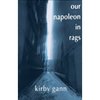They’re No Five Ladies From New York
National Book Award nods are out:
Fiction: The March by E.L. Doctorow (Random House); Veronica by Mary Gaitskill (Pantheon); Trance by Christopher Sorrentino (FSG); Holy Skirts by Rene Steinke (William Morrow); Europe Central by William T. Vollmann (Viking)
Nonfiction: Out of Eden: An Odyssey of Ecological Invasion by Alan Burdick (FSG); Jean-Jacques Rousseau: Restless Genius by Leo Damrosch (Houghton Mifflin); The Year of Magical Thinking by Joan Didion (Knopf); 102 Minutes: The Untold Story of the Fight to Survive Inside the Twin Towers by Jim Dwyer and Kevin Flynn; Bury the Chains: Prophets and Rebels in the Fight to Free and Empire’s Slaves by Adam Hochschild (Houghton Mifflin)
Poetry: Where Shall I Wander by John Ashberry (Ecco); Star Dust by Frank Bidart (FSG); Habitat: New and Selected Poems, 1965-2005 by Brendan Galvin (Louisiane State University Press); Migration: New and Selected Poems by W.S. Merwin (Copper Canyon Press); The Moment’s Equation by Vern Rutsala (Ashland Poetry Press)
Young People’s Literature: The Penderwicks by Jeanne Birdsall (Knopf); Where I Want to Be by Adele Griffin (Putnam); Inexcusable by Chris Lynch (Atheneum); Autobiography of My Dead Brother by Walter Dean Myers (HarperTempest); Each Little Bird That Sings by Deborah Wiles (Harcourt).
They’re No Five Ladies From New York Read More »

